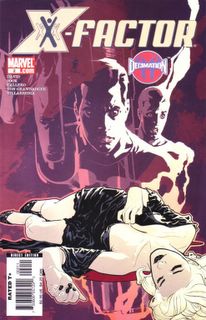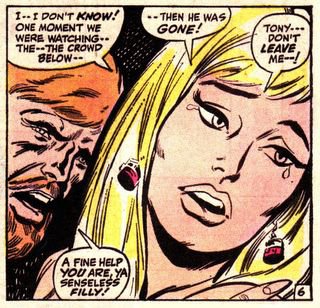Factor the drawing board

X-Factor 1 - 3
To my surprise, I find I've been reading X-Factor.
Those who bought comics in the 1990s remember them as a long, shrill, anguished wail punctuated with staccato bursts of hysterical sobbing. At the beginning of the decade there was a huge boom in interest and comics prices, and there was an accompanying change in how Marvel viewed its product. Noticing that most comics readers were also comics collectors, it started putting out product solely with collection in mind. Crossovers! Events! Limited Edition Balsa Wood and Salami covers! You couldn't dam up the flood of this stuff.
Back then, as now, Marvel's premier product was the X-Men. It started as one comic, then New Mutants joined it. Then there was Wolverine. Excalibur. X-Force. X-Men. Generation X. X-Files (or was that something else? I think I need a fact checker). Marvel took the corporate decision to push out as much product as it could, without regard either to quality or its own long-term prospects.
Now we could argue about what the nadir of all this was - was it the splitting of the X-Men into their wretched gold and blue teams? The turgid Excalibur? The irritating, slurring, vapid Gambit? Or how about big-gunned, lumpen-headed Cable with his rough, tough, gruff, bluff attitude? Oh, it would be tempting to put Cable at the bottom of the bonfire.
Except that, for me, nothing summed up the futility of the times more than X-Factor. An initially poor concept (the original X-Men brought back together as pretend mutant hunters who are secretly helping their victims) degenerated into no concept at all. Staffed wholly by Z-List mutants desired by none of the main X-Men writers, it could have filled a niche, but no-one invented one. It just carried on, purposeless and flaccid, scripted (in the main) by people who would rather be elsewhere.
So why did I buy the damn thing? Because it took me a few years to realise I was being had. Because I was a collector as well as a reader. Because I loved all things mutant. Because I was an idiot.
Slowly but collectively, though, we did realise how bad comics had become, and we stopped buying. Comic sales collapsed, a lot of sharp marketing professionals lost their jobs, and Marvel eventually came round to realising that you can only piss in the well so many times before it becomes undrinkable. We like to whinge, but the quality of comics is now higher than it's ever been.
Now there are certain nineties revivals that you figure are never going to happen, like a Shed Seven comeback tour or putting John Major back in Downing Street, not because it's impossible to achieve, but because you can't see why anyone would want to bother. X-Factor is surely one of those. Normally, I would expect to skip past Marvel's new X-Factor without the vaguest desire even to browse it.
Except, and it's a big except, the new X-Factor is written by Peter David. David is in the position of being one of comics' best writers, but being perenially ignored by those in the editors chairs. His Captain Marvel was a work of pure genius, funny and sad and tragic and challenging and all those things you want from a comic book but rarely get. Obviously, it sold like a dog, but quality often doesn't sell. As far as I know, Peter David doesn't get work off DC at all. Last year Joe Quesada pointedly missed David off his list of Marvel's top writers. I don't understand why. Perhaps David has tourettes or bad breath or keeps called Quesada "fat boy"?
Anyway, I'll follow Peter David anywhere, even back to his revived X-Factor (he was one of the writers on the orignal series, though, typically, I managed to miss this, instead hunkering down for the Mackie years).
It's even got a concept this time - X-Factor is an investigations agency. If I find myself cringing at the absurd Strong Guy or that ridiculous Werewolf with the Brigadoon accent, there is still the magnificently stroppy Monet and the schizophrenic Jamie Maddox to enjoy. And behind it all, Peter David carries off his story with a firm touch, and drops in just enough foreshadowing to make me want to come back for more. It's too early to say if it's good, but it's definitely not bad.
I like X-Factor. Now there are words I thought I'd never write.




